Feature image credit courtesy of KISS Facebook (official)
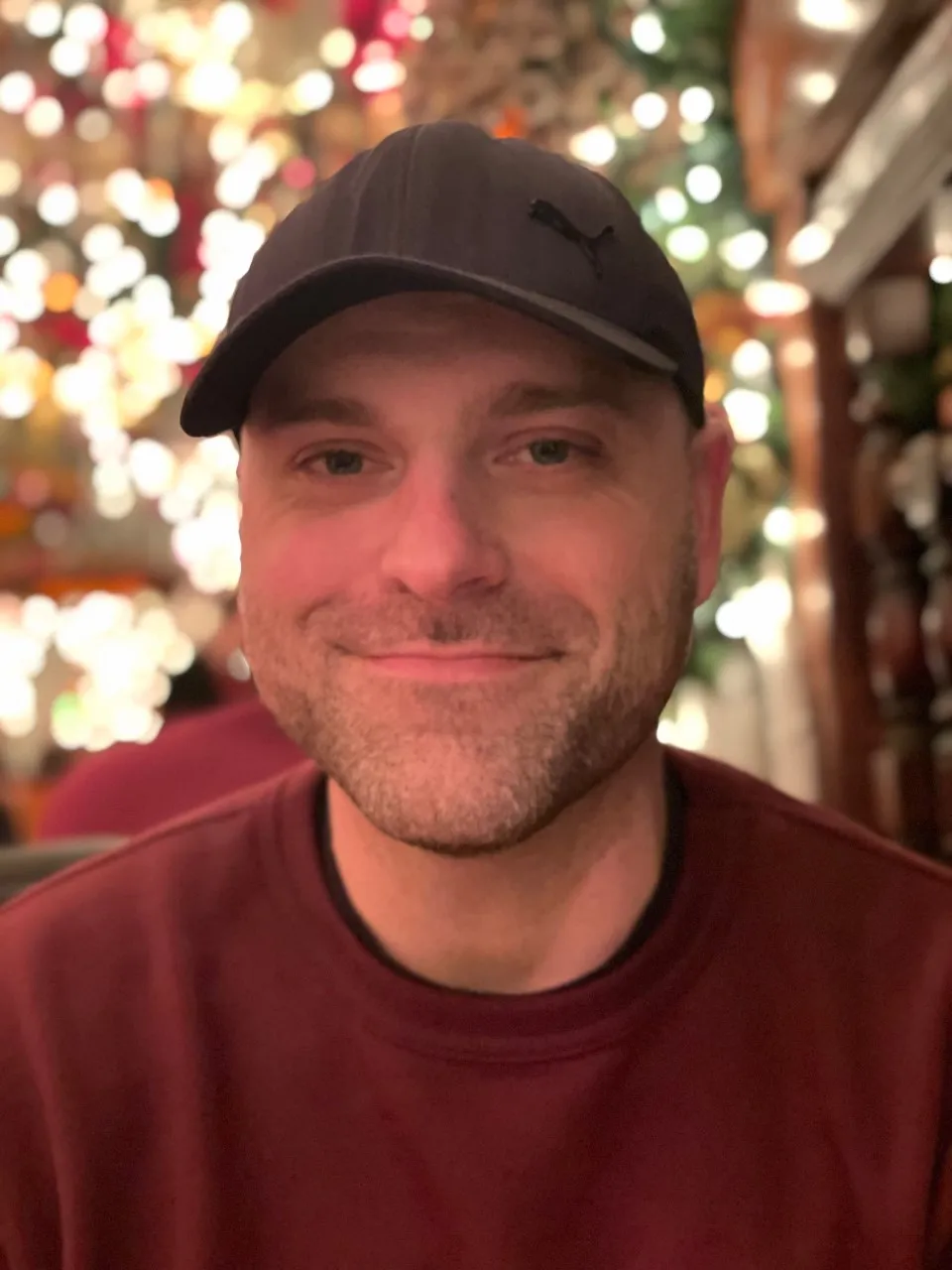
By Andrew Daly
andrew@vinylwriter.com

Veteran manager Larry Mazer’s KISS fandom runs deep. Little did he know as a young fan in the early 70s, that he would be tasked with saving the band in the late 80s, and early 90s.
When Larry Mazer entered the world of KISS, the band was in the midst of a downswing after Crazy Nights (1987), and its subsequent tour had failed to meet expectations. As Mazer entered the fold, his directive was simple: to reposition KISS as a viable hard rock act by doing the things that made them famous.
With Hot in the Shade (1989) already in the can, Mazer’s impact was immediate, and through shrewd business decisions, and a willingness to take chances, Mazer ruddered KISS toward its first top-ten single, and ushered them onto the road to undertake what amounted to perhaps their most legendary stage production yet.
As the 90s dawned, quality songwriting, innovative musicianship, and an elite stage presence reigned supreme. Under Mazer’s management, KISS produced one of its career-defining recorded in Revenge (1992), proving to the world that under the layers of hairspray and lipstick, KISS was still a bone-crushing band capable of chart-topping success.
Ultimately, in 1994, a difference of opinions regarding KISS’ direction led to Mazer moving on, and in his wake, a makeup-caked mudslide of KISS conventions, Unplugged shows, and reunion tours began. While Mazer wasn’t in place to oversee KISS’ next phase, his influence on the band’s trajectory is undeniable.
I recently sat down with Mazer to discuss his five-year KISS tenure, where among other things, we hit on his objectives for KISS going in, Ace Frehley being asked to support KISS on tour, the lingering rumors of Eric Carr being fired, his potential involvement in KISS’ 90s reunion, and a whole lot more.
Andrew:
Larry, thanks for taking the time with me to look back on your time with KISS. When you first signed on with KISS, what were your initial goals?
Larry:
Well, I had been a KISS fan since their very first album, so I was very knowledgeable about their entire career from the beginning up until the time I got called in 1989. What attracted me to the band originally was the fact that the band had multiple lead singers in Paul Stanley and Gene Simmons. And then, when the makeup came off from the Lick It Up record forward, there had never been a Gene Simmons single that really led the way for any album cycle. You know, Gene had gotten off into other tangents, he was getting into acting in some horrible movies, he has started a record company called Simmons Records, he had gotten into artist management where he was managing Liza Minnelli. So, I just felt that if KISS wanted to get back to where they were, Gene really needed to reassert himself as a songwriter, and as a second lead singer in the band. And that was the demand I made when I had my meeting to get hired for the job, I said, “Gene needs to get back at it, and be an equal creative member of KISS.”
Andrew:
Coming off the Crazy Nights Tour, in your estimation, where was the band commercially going into Hot in the Shade?
Larry:
You know, they were still selling records. At that point, their last two albums in Asylum and Crazy Nights weren’t platinum records, but I think I think Asylum and Crazy Nights were both gold records. So, they were still consistently selling albums, but their concert ticket sales had gone down drastically to where they were no longer selling out full arenas. They definitely were at a crossroads, and in my estimation, KISS needed to do something drastic to try and recapture what they had achieved before. That was my idea going in, and it’s the directive I gave the band as well.
Andrew:
Hot in the Shade featured a noticeable back-to-basics approach. Do you feel that KISS had gone too far down the glam rabbit hole, so to speak?
Larry:
Yes, and no. I mean, Paul Stanley had always written pop songs. If you go back to the 70s with Rock and Roll Over or Dynasty, Paul was always a pop singer. Look at songs like “Sure No Something,” or “I Was Made For Loving You,” those are pop songs. Paul was a rock guy on one hand, but when it came down to it, he always had that pop sensibility. Then you have Gene, who for lack of a better term, was the “heavy metal guy” in the band, with songs like “I Love It Loud” for example. So, to me, that element was gone, and KISS needed to have both elements to make it fully work s a complete package. I think they had two very distinct fan bases that blended together and crossed over. There’s a heavier side, which I felt was represented by Gene, and then there was a more commercial pop side, which was Paul’s deal. If you look back, every record had a Paul Stanley pop-type song, so I don’t think anything changed except that Gene Simmons was missing from the mix. I think a portion of the audience – Gene’s portion – wanted to see a KISS that featured both sides of the band, not just the more pop-leaning side.
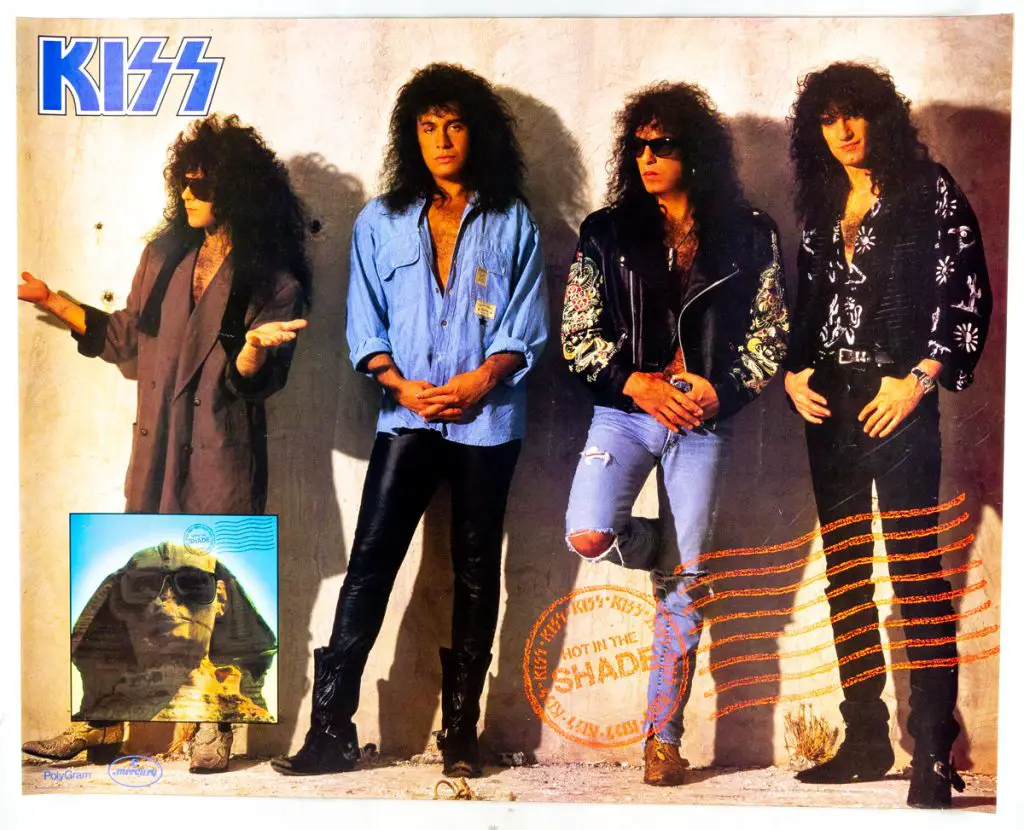

Andrew:
Would you say that Gene Simmons asserted himself more on Hot in the Shade?
Larry:
Well, my record was Revenge, because Hot in the Shade was mostly recorded by the time I was hired. In most ways, it was already a finished record, so there’s not much I could do there. I will say that to this day, I do not think Hot in the Shade is a great record. I think there are three great songs, and the rest of it is filler. The album that I really stake my reputation on is the Revenge record because that was me forcefully putting my foot down as far as Gene coming back into the mix was concerned. I said, “Guys, if we’re going to do this and do this right, Gene needs to be upfront. We have to get heavier.” And we lead off with a Gene Simmons song for the first time since the Creatures of the Night record, and that was a Gene Simmons song called “Unholy.” We had another track in “Domino,” that I wanted to go second, but I got voted down, so “Domino” ended up being the third single. Again, my goal was to bring back the heavier side of KISS, and I think I achieved that.
Andrew:
Going back to the Hot in the Shade era, what sort of adversity did you face in initially booking the tour?
Larry:
The promoters were very skeptical that KISS could sell tickets. I mean, the Crazy Nights Tour had not done exceedingly well, and there was a number that had to be reached for them to be able to tour, and promoters were just not coming back. So we parked it for a few months until the “Forever” single came out, and that became a big hit, it was their first top-ten single. After that, we decided to go forward knowing that there was a driver that would hopefully fill the seats, which it did with “Forever.”
Andrew:
The Hot in the Shade Tour’s setlist noticeably was full of 70s and early 80s KISS classics. Was that done to try and bring back fans who had gone astray? Was there any pushback from Eric or Bruce to that end?
Larry:
Yeah, absolutely. And Eric [Carr] and Bruce [Kulick], they loved it. I mean, Bruce is one of my best friends to this day. We’ve never lost contact. I managed Union, which was the band he formed after he got let go by KISS. I think Bruce did a podcast about a month ago, where he talked about the Revenge album, and he talked specifically about how much he loved playing the old songs. Remember, Bruce was very involved with songwriting on that record because that is a very guitar-driven record. So, Bruce really did have a lot of input into that record, and that era.


Andrew:
As I understand it, KISS had big hopes for “Hide Your Heart,” but Ace Frehley choosing to release his version as the lead single from Trouble Walkin’ threw a wrench into things, right?
Larry:
Yes, that was the lead single, and they did a video for it. I was hired just as that single and video had come out. The problem was that there were four other versions of it: Ace Frehley, Robin Beck, Bonnie Tyler, and Molly Hatchet, with KISS being the fifth. Bonnie Tyler’s came out in ’88, and the other three all came out at the same time in ’89, so it just diffused it ridiculously. By the time I got there, “Hide Your Heart” had already been scheduled as the first single and was set to be released. I didn’t really have any input into it. If I had been there, that never would have happened. I just remember that it was the stupidest thing I ever saw that three bands all put out the exact same song, at the exact same time, one of which was KISS’ former guitar player. Coming in, that really surprised me.
Andrew:
What sort of a push was there to try to keep Ace from putting his version out as a single?
Larry:
Again, I wasn’t there yet, so I don’t know. I mean, by the time I got hired, all four versions were already out. So I really don’t know. It’s hard to say. I am sure there were discussions about that, but I wasn’t privy to them as I hadn’t come in yet.
Andrew:
Retrospectively, a lot of people attribute the upswing in ticket sales on the Hot in the Shade Tour to the inclusion of Slaughter as KISS’opening act. How big of an effect did that have?
Larry:
I’ve always prided myself on trying to put together the best package that I could. I’ve given a lot of bands their first tours. Like with the Cinderella tour that I did right before I signed on with KISS, I’d given Winger, and BulletBoys their first tours, and both those bands were gold record bands. As a manager, you always try and look around to see who you think can help sell tickets, and Slaughter was a band who had come out of the gate strong with its first record. So, to me, it was obvious to put them on, and then I took a chance and booked a band called Little Caesar for part of the tour as the opening act. They were a brand new band and were babies at the time, but I just loved the band. You always want to package whatever you can to sell tickets. Even to this day, if you look at the Stadium Tour going on this summer with Def Leppard, Mötley Crüe, Poison, and Joan Jett, that’s something where one plus one plus one plus one equals six, which is done by selling out every stadium that it’s playing in. So obviously, you always want to try and put together the best package you can to sell tickets. At that point, there were a bunch of bands breaking like Winger, BulletBoys, Slaughter, Warrant, and others. There were several acts to choose from, and I liked that first Slaughter record, so I said, “Let’s try them.”

Andrew:
One longstanding rumor is that Britny Fox was set to be KISS’ opener, but got bumped for Slaughter. Is there any truth to that?
Larry:
You know, I gotta be honest with everybody, a couple of people have said this to me, asking why Britny Fox was bumped from the KISS tour. Honestly, I have no recollection of Britny Fox ever even being considered for the slot. I don’t remember that at all.
Andrew:
Perhaps it was in the initial conversations before the tour got pushed back in the wake of “Hide Your Heart?”
Larry:
Not that I remember. Now, it’s thirty-some-odd years ago. I guess it’s possible that I forgot, but I literally do not remember that at all. You have to remember, Britny Fox was made up of ex-Cinderella guys, and being a Philly guy, I kind of think that I would have remembered that happening.
Andrew:
Another rumor that’s persisted over the years is that Ace Frehley was potentially tabbed to open up for KISS on the tour, but the “Hide Your Heart” fiasco put that to bed. Is there any truth to that?
Larry:
Ace Frehley was absolutely considered for support, and he turned it down. He just said, “I’m not going to do it.” It had nothing to do with “Hide Your Heart” though. Initially, I suggested Ace Frehley, and I went so far as to check him out and ask him. I asked him, and he came back and said, “I’m not interested.”
Andrew:
Did he give any reasons why?
Larry:
I don’t remember. I just remember he passed on opening for KISS on that tour, and I moved on. But that is true. I definitely put forth the idea of Ace Frehley opening for KISS, and we went as far as to ask him, but Ace declined the slot.

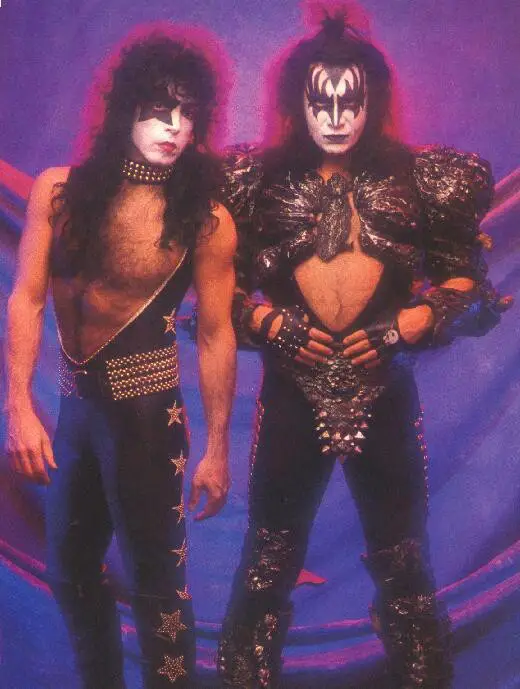
Andrew:
Once again, more conjecture here, but another rumor that’s persisted is that with a setlist full of 70s classics, a video where Paul and Gene put the makeup back on, and Ace being asked to open, some wheels seemed to be in motion. The assertion has been that Ace was being considered for re-entry into KISS. Was that on the table at the time?
Larry:
Nope. Never. Gene and Paul never discussed that with me ever. It was never on the table, and there’s no truth to that rumor at all. And with the “Rise To It” video, that was my idea. It was all based around the fact that from literally the day I took over as KISS’ manager, every promoter in the world would call me and say, “When will they put the makeup back on?” It was literally every day that promoters were calling me up, and offering ridiculous amounts of money for them to put the makeup back on. So the “Rise To It” video was my way to shut people up by saying, “Okay, they want makeup? Here’s makeup.” I had the idea, and I went to Paul and Gene, and I said, “I have this idea. How about we do a video where you two wear the makeup?” … “Alright, we like it. We’ll do it.” See, that was my attempt to just shut it down as far as all that makeup talk.
Andrew:
Perhaps the stories of promoters calling you up asking for a reunion morphed into Ace being considered for reinstatement? In regards to the offer, were these offers for the original four? Or offers for makeup with Eric Carr, as in the also beloved early 80s incarnation of KISS?
Larry:
Oh yeah. That’s what it was. These promoters wanted KISS in makeup, with the original four. It was the original four with Peter Criss. There were no offers for Eric Carr, no Vinnie Vincent. It was always for Gene, Paul, Ace, and Peter. But remember, that was never considered. And like I said, the video was my way of shutting it down, it was me saying, “Okay, you want to make up? There you go. There’s three minutes of the makeup.”
Andrew:
The stage set and show for the Hot in the Shade Tour proved to be extremely memorable. How was that developed?
Larry:
Well, you know, historically, I love putting on huge stage shows. I had just done the Long Cold Winter show with Cinderella the year before, which I thought was a spectacular live show. I love putting together shows. My first KISS tour was interesting because historically, the centerpiece of every show from day one had always been the KISS logo, but I had other ideas. So, we had a meeting and I said, “Look at what we have here, look at the album cover. It’s obvious that the Sphinx should be the centerpiece of the show. Let’s do all kinds of things around that, but it’s the focal point.” So, the band agreed, and I brought in the same design team I used for the Cinderella Long Cold Winter Tour, it was the exact same people. I called them, we sat down, and we designed the stage with the Sphinx, we worked out how the lights were going to work, and the whole thing. The big thing and I forget whose idea it was, but then the decision for the ending was that at the end of the show, the Sphinx would blow up, and then out from under the stage, during the encore, the KISS logo would rise up in its place, taking the show to another level. Now, not to pat myself on the back, but I’ve been to every KISS tour since the beginning, and people might argue, but I think that was the greatest live KISS stage show they’ve ever had. Their best, in my opinion, was the Hot in the Shade Tour. I’m very proud of that stage show to this day.
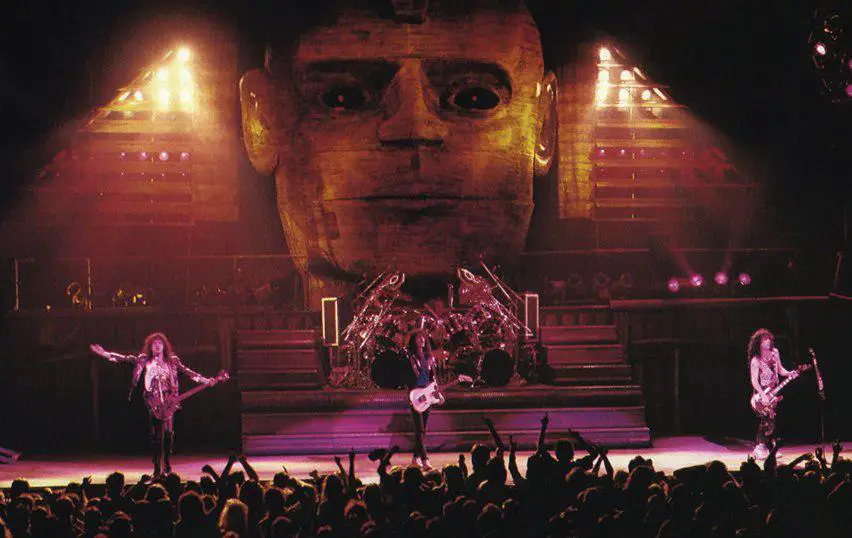
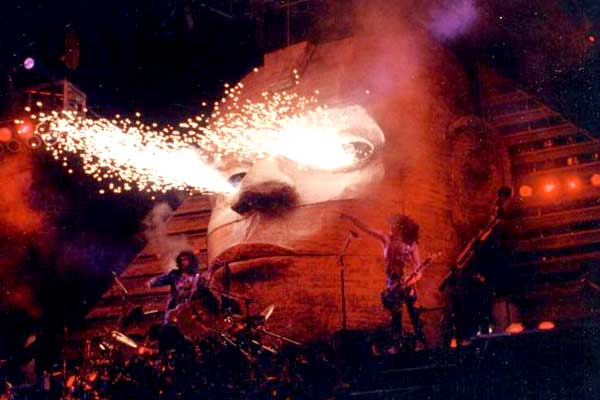

Andrew:
I agree with your assessment. The stage show, coupled with the incredible setlist truly made that tour special, which is interesting as Hot in the Shade is generally not considered to be one of KISS’ stronger albums.
Larry:
Right, and it’s also funny because the Revenge album is one of their best, and even though the stage show for that tour was good, I favor the Hot in the Shade Tour, to be honest. It was the same design team for the Revenge Tour that we used on the previous tour, but to me, it just fell a little short of what we had done with the Hot in the Shade production.
Andrew:
There has been a lot of speculation as to Eric Carr’s state of mind around this time in regards to perceived animosity over not getting enough songs in, or perhaps being replaced by Eric Singer, who had played with Paul on his solo tour in ’89. Where was Eric’s head at around that time?
Larry:
Honestly, Eric was fine. There were no issues, and I never felt any animosity. To my knowledge, there was nothing. I mean, listen, it’s very simple – Eric Carr got sick. He got sick, and that’s why he was replaced. Sure, you can get replaced because people didn’t like you, and you can be replaced because of your performance, but Eric Carr got replaced because he was sick, and unfortunately, he died. I mean, that’s why he was replaced, there’s no mystery or conspiracy to it. There’s no hidden anything. I was there, and there was never a discussion about replacing Eric Carr. Not ever. It was that he developed a very sad disease, and it killed him. That’s why he was replaced.
Andrew:
In regards to the long-standing rumor that Eric Carr was to be fired regardless of the fact that he got sick, that’s not true?
Larry:
Totally not true. It’s crazy, where do these rumors come from? This said, it’s very funny. I, unfortunately, got off on a not great foot with Eric, because when I got hired Gene, and Paul asked me to call Eric. I had already known Bruce, but I didn’t know Eric, so Paul and Gene said, “Look, you should call him, introduce yourself, and tell him you’re now our manager.” So, I called Eric, and literally, the first thing I said to him was, “I hate drum solos.” [Laughs]. So, right away, things between us were not great. Now, we got friendlier as the cycle went on, but it started off a little tense, because I told him, “I hate drum solos,” which I do. As the tour went on, we got friendlier, and we stayed friendly up until the point where he got sick. There was never a directive to fire Eric Carr from me, and again, I never sensed any tension between him and the other guys at all. I don’t know where all these rumors come from, but I thought it was a wonderful tour that was happy from beginning to end.


Andrew:
Going into the Revenge era now. Eric Carr gets sick, but the band needed to record an album. What was the mindset once the band found out Eric was ill?
Larry:
Well, it was obvious he was not going to recover, but we knew the band had to continue. Unfortunately, it’s just it’s the way it is. It’s something that’s faced by many bands where members have died, and those bands have had to go on. With Eric, it was obvious that he was not going to recover, and we needed to keep going forward, so we said, “Let’s go forward with Eric Singer.” Paul had obviously worked with Eric Singer on his ’89 solo club tour, and I knew Eric because I had tried to manage Badlands, which he was in. It was just a natural thing for Eric Singer to then become the drummer of KISS, because we had a history with him, and he fit in well.
Andrew:
As you mentioned, Revenge saw Gene Simmons positioned front and center from a musical standpoint. What went into the decision to release “Unholy” as the lead single?
Larry:
I can tell you that putting “Unholy” out first got pushback from Paul, but I put my foot down and I said, “No, Paul. “Unholy” is going to be first.” I wouldn’t be swayed, and I refused to be moved off my view. I said, “Paul, you hired me to do this. This is my decision. We’re going with “Unholy” first, and that’s the end of it.” He wasn’t happy at first, but it obviously worked out.
Andrew:
Which track did Paul want as the lead single?
Larry:
Any one of his songs. [Laughs]. I think you know the answer, because what was the second single? History shows that it was “I Just Wanna,” so there you go. That’s what Paul wanted as Revenge’s lead single. I didn’t agree with that either, I wanted to go with “Domino” as the second single. I was pushing for that, and again, Paul was not happy, even after “Unholy” had been successful, so “Domino” seemed like the obvious call. Well, Gene called me up one day, and said, “Larry, we have got to give a Paul song.” I said, “Gene, look what we just did. We rebuilt this band. We rebuilt you. We’ve got to bring it home. We have this other track in “Domino,” and it’s a great song. It’s a boogie song. It’s perfect. That’s got to be the second single.” So, Gene said, “You’ve got to trust me on this. There’s peace in the valley that’s got to be kept. We’ve got to have a Paul song be the next song.” And that’s why “I Just Wanna” was the second single, which I still don’t agree with. [Laughs].

Andrew:
After the issues surrounding Music from “The Elder,” how did Bob Ezrin re-enter the fold for the Revenge sessions, and what was his greatest impact on the recording?
Larry:
It was huge. I think the biggest impact on that record was getting Bob Ezrin in as producer. They had used him for the “God Gave Rock “N’ Roll To You II” single, and they just felt like there was a meeting of the minds. Then I said, “Absolutely, he’s the perfect guy.” I mean, you have to remember, Bob did what I think is probably the best KISS album in history in Destroyer, so you can’t blame the guy for a perceived misstep with Music from “The Elder.” You know, there are people now who listen to The Elder and think it’s a great record. Look, with that album, it was just him coming off The Wall with Pink Floyd, and they were into this concept album thing. I guess Gene had a vision, Bob bought into it, and they made the record. That said, I still think that “A World Without Heros” is one of the greatest KISS songs of all time. I love that song. That’s a Gene song that I think is incredible. But a lot of people still like The Elder, and while it was considered to be a complete mess up at the time, they came back stronger with Creatures of the Night, so it worked out. I don’t think you can blame a guy for a misstep, especially if he’s a legendary producer.
Andrew:
By the time Revenge rolled around, KISS had gotten into the habit of using outside songwriters at times. In this instance, they brought in Vinnie Vincent, who did not have a good ending with KISS in the 80s. What went into that decision?
Larry:
I gotta be honest with you, I have no clue. I really don’t. [Laughs]. Admittedly, I’m not a big recording studio guy. I can’t sit there and listen to take after take. I remember they were recording in L.A. and I live in Philadelphia, so I wasn’t there full time anyway. But I remember the one time I did go out there to talk about artwork, and whatever else, I walked in, and I saw this guy in the corner sitting there. I didn’t know who he was, but there was this guy with longish hair, and he was just sitting there writing in a notebook. I had no idea who it was. So, after I left the studio, I pulled Bruce Kulick aside, and said, “Who was that guy sitting there?” … “Oh, that’s Vinnie Vincent.” … “You’re kidding me? I don’t even recognize him.” I have no idea how that happened, or what led them to bring Vinnie back into the mix.
Andrew:
Fast forward a couple of years, and we’re creeping up on the reunion era. How far back did the rumblings of the reunion go given that promoters were often banging down your door for one?
Larry:
Well, sure I always got calls, but remember, I was only there until ’94. During the Revenge Tour, it never came up. And to be honest with you, my understanding is it all happened because they did the KISS Conventions. They invited Ace and Peter Criss to come and play it at different KISS Conventions when they were around, and somebody from MTV saw it, flipped out, and said, “Hey, would you guys consider doing MTV Unplugged,” and they did it. I guess it went really well, but I wasn’t there. As I understand it, that was the first time where the talk veered toward, “Hey, maybe the four of us should reunite.” You have to also remember, KISS had made that horrible Carnival of Souls record, where they wanted to be Alice in Chains, which Mercury Records didn’t even want to put out. I think they were definitely at a crossroads at that point. I mean, I was gone, there was no manager, and they were doing it themselves. They made that horrible record, and it wasn’t released, so then they came up with the idea of doing KISS Conventions all over the United States.
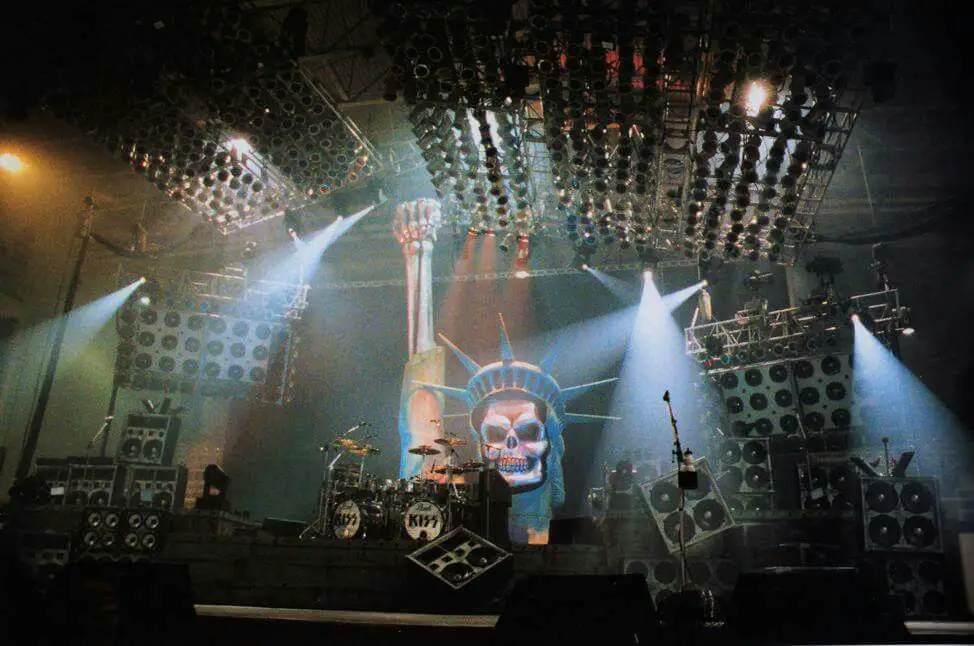
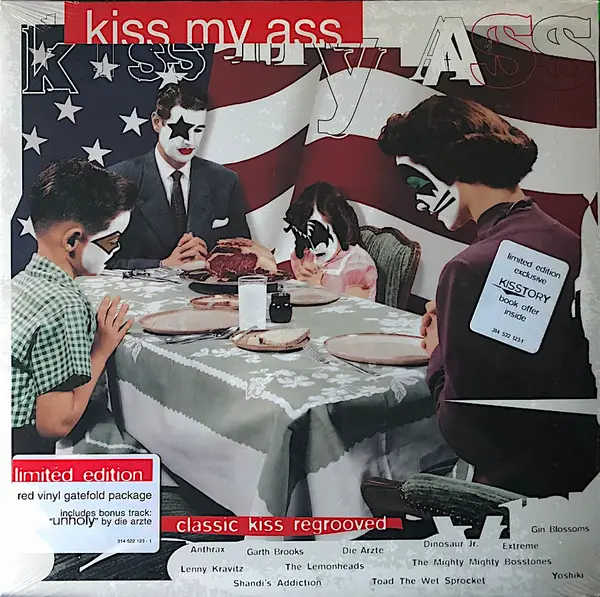
Andrew:
How about the KISS My Ass tribute record? When did that come into the mix?
Larry:
Gene never wants to see anybody else making money off KISS. [Laughs]. So his thing was, “Hey, let’s do it ourselves and make all the money for ourselves.” It started because I had brought a record on the bus called Hard to Believe: A Kiss Covers Compilation, which was Seattle bands doing KISS songs. Well, right away Gene called me and said, “I’ve got an idea. Let’s do a tribute record to ourselves.” … “Gene, that’s not what’s cool. What’s cool is that all these bands did this on their own.” … “No, no, no, we’re gonna do it. We’re gonna call it KISS My Ass. Go get $2 million from Mercury Records, we’re gonna do it.” I said, “No,” and from there, things snowballed leading to me leaving as their manager. So, I’m gone, and now there was no manager, and then people were making money with these KISS Conventions, and that’s when they had the idea, “Well, let’s do these Kiss Conventions ourselves.” Like I said, Ace and Peter came, and then somebody from MTV saw it and suggested they do a reunion for Unplugged. That led to them talking about putting the makeup back on, and then the promoters started calling with big-money offers around ’95, and the shows kicked off in ’96.
Andrew:
Was it only the KISS My Ass debacle that caused the fracture for you?
Larry:
I really can’t get into much detail about it, because there are a bunch of things that aren’t worth talking about but that was a big part of it for sure.
Andrew:
I ask, becasue as I understand it, you had the opportunity to manage KISS again at the onset of the reunion. Is that right?
Larry:
Wow, that’s a good one, because very few people, if anybody, really knows that. Who told you that? Well, it is true. In 1996, much to my surprise, I was in the office one day, and the phone rang, and it was Paul and Gene. They said, “Hi Larry. You’ve probably heard that the four of us are going out on tour. We want to talk, and get your perspective.” I said, “Yes, I have heard…” but you know, I guess I probably didn’t give a very enthusiastic pitch because to me, that’s not what I thought was the right thing. My attitude dates back to where we were in the early 90s. It had not changed. They never should have made Carnival of Souls, they should have kept working with Ezrin, and they should have kept writing great songs. I’ve said this before, and I’ll say it again, I really believe the next album, if they had stuck with that plan, would have been, for lack of a better term, would have been their Sgt. Pepper. I really believe that the next album would have been beyond belief for KISS had they done that. I feel that way because everyone was dialed in. I was dialed in. Gene was dialed in. To this day, I really believe it.
So when Paul and Gene called me, I probably didn’t show the right amount of enthusiasm because to me, that was just going for the money. Now, I love money as much as the next guy, but that’s not what my vision for managing KISS was. I was there when the band had its first top-ten single, I then oversaw what I think is one of the best records of their career in Revenge. I helped breathe life into some of the best stage shows of KISS’ career. I wanted to then go to the next level, and to me, putting on the makeup and reuniting only amounted to bringing back two guys who were lesser musicians in my mind. Ace and Peter were lesser musicians than Bruce Kulick and Eric Singer at that point, and I just thought it was it was all about the money. Who are we kidding? Since ’96 or ’97, ask anyone, and they will tell you that it’s been all about the money. It’s been strictly about the money. So, I probably didn’t show enough enthusiasm, and they then hired Doc McGhee. So, that is 100% True. They did call me. That being said, I never told anybody, so that’s impressive that you found that out. I just let it go at that point, and maybe told a couple of people, but I didn’t really make it a big deal that they called me.


Andrew:
Do you feel that the reunion killed KISS as a creative entity?
Larry:
Absolutely. I mean, sure, there were some good songs on Psycho Circus. I liked a few tracks, and the title track was cool, but as for the rest of it, I could take it or leave it. There are a couple of good songs on Monster, and a couple of good ones on Sonic Boom, but those are not albums like Revenge, which is a perfect album from top to bottom, in my opinion. The reunion definitely halted KISS as a creative band.
Andrew;
You mentioned that Eric Carr was not to be fired. So given his status in the band, and given the fact that a lot of fans loved him even more than Peter, do you think that the reunion would have happened had Eric Carr been alive?
Larry:
Yeah, probably. Again, I think what we had in Revenge was special, but instead, they wanted to pretend to be a Seattle band, and do that shitty Carnival of Souls album. So, it became about the money. If Eric Carr was alive, I don’t know if he would have been asked to be part of the makeup tour. I really believe that at that point, it was going to be the original four. I don’t think he would have been asked. No way Vinnie Vincent was going to be asked. [Laughs]. I think the intention always was that if they were gonna do the makeup, then it had to be with Peter Criss and Ace Frehley.
Andrew:
Last one, Larry. When you look back at your time managing KISS, what are your lasting impressions?
Larry:
I always tell people that the five years I spent managing KISS were the most fun I’ve ever had managing any band in my career. I’ve been managing bands for fifty years, and I’m still doing it. Right now, I’m working with Buckcherry, and Blacktop Mojo. Now that Pat Benatar is in, I’ve got three artists that I’ve managed who are in the Rock and Roll Hall of Fame. I’m very proud of the fact that I discovered Breaking Benjamin. I’m very proud of the fact that I discovered Lamb of God. I managed Cheap Trick, Peter Frampton, and Cinderella. I’ve done amazing tours, and helped so many young bands get their first exposure. Still, even with all of that, I always tell people that the five years I spent with KISS were the most fun that I ever had in my life. You know, with those two, with Paul and Gene, there were no guardrails. It was so creative in terms of what we could do. You can do anything with KISS, and we did, and we had a blast doing it. We laughed every day, and I had the time of my life. It was just the most fun I’ve ever had managing bands. I will always look back on it fondly, and be proud of what I accomplished with them to move their career forward. KISS brought me in to do that because they knew I could, and I think I did that. I know I did.
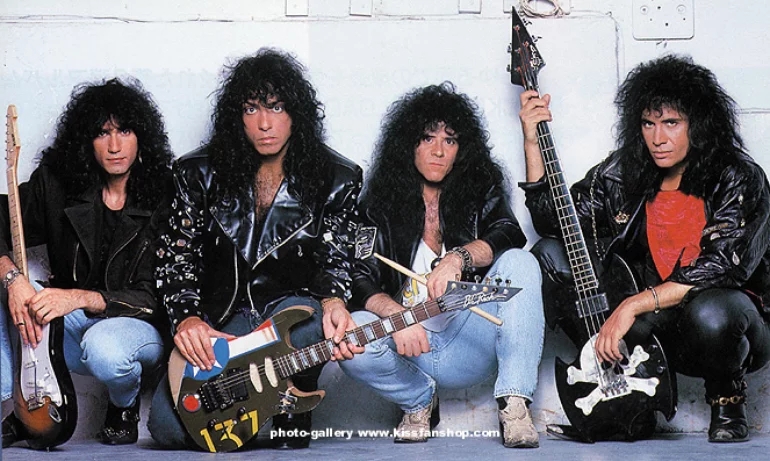

– Andrew Daly (@vwmusicrocks) is the Editor-in-Chief for www.vwmusicrocks.com and may be reached at andrew@vinylwriter.com
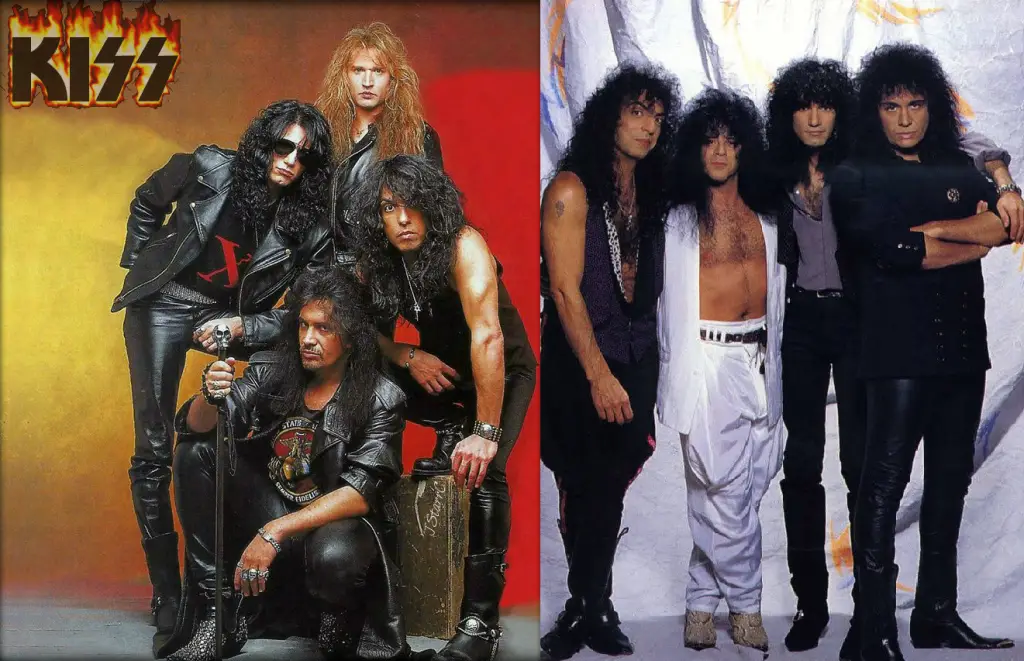




Leave a Reply